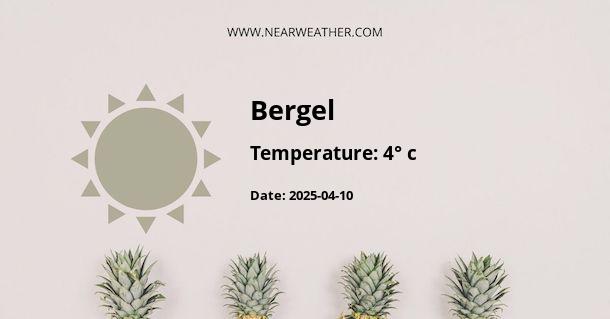Bergel, Germany: Climate and Weather Overview
Bergel is a small municipality located in the state of Bavaria, Germany. Nestled in the picturesque Bavarian Alps, the region offers a diverse climate and a stunning natural landscape. Understanding the climate and weather patterns of Bergel can be essential for residents, tourists, and businesses alike. In this article, we will delve into the year-round climate of Bergel, exploring its temperature variations, precipitation levels, and other weather phenomena.
Temperature Patterns
The climate in Bergel can be classified as a temperate oceanic climate with mild summers and relatively cold winters. The average annual temperature in Bergel is around 8.5 degrees Celsius (47.3 degrees Fahrenheit). However, the temperature can vary significantly throughout the year, with distinct seasonal changes.
During the summer months of June, July, and August, temperatures in Bergel typically range from 15 to 25 degrees Celsius (59 to 77 degrees Fahrenheit). These months offer pleasant weather, making it an ideal time for outdoor activities such as hiking, biking, and exploring the beautiful landscapes of the Bavarian Alps.
Winter in Bergel brings colder temperatures, with average highs ranging from -1 to 4 degrees Celsius (30.2 to 39.2 degrees Fahrenheit). The winter months of December, January, and February often experience snowfall, creating a picturesque winter wonderland. It is a popular time for winter sports enthusiasts to visit the region, with skiing, snowboarding, and ice skating being popular activities.
Precipitation Levels
Bergel experiences a moderate amount of rainfall throughout the year. The wettest months are typically June and July, while the driest months are usually February and March. The annual precipitation in Bergel averages around 1,300 millimeters (51.2 inches), spread relatively evenly across the year.
The summer months receive around 120 to 140 millimeters (4.7 to 5.5 inches) of rainfall, providing nourishment to the lush greenery and contributing to the region's vibrant flora. The winter months, on the other hand, receive less precipitation, often in the form of snow. Snowfall can range from light dustings to heavier snowstorms, creating a magical winter landscape.
Weather Phenomena
Bergel, like many other regions in the Bavarian Alps, is susceptible to specific weather phenomena due to its geographical location. The mountainous terrain can influence weather patterns, resulting in unique meteorological events.
Foehn winds are a common occurrence in the region. These warm, dry winds descend from the mountains, bringing higher temperatures and reducing humidity. Foehn winds can lead to rapid snowmelt, especially during the winter months, and can influence the local microclimate.
Thunderstorms are also relatively common in Bergel, particularly during the summer months. The combination of warm, moist air from the surrounding lowlands and the cooler air in the mountains can trigger thunderstorms, occasionally accompanied by heavy rainfall, lightning, and thunder.
Conclusion
Bergel, Germany, offers a temperate oceanic climate with mild summers and colder winters. The average annual temperature hovers around 8.5 degrees Celsius (47.3 degrees Fahrenheit), with distinct seasonal variations. The region receives an average of 1,300 millimeters (51.2 inches) of precipitation per year, with wetter summers and drier winters. The mountainous terrain can influence weather patterns, leading to foehn winds and occasional thunderstorms. Whether you are planning to visit Bergel for its natural beauty, engage in outdoor activities, or simply enjoy the changing seasons, understanding its climate and weather patterns can enhance your experience.
A - Bergel's Latitude is 49.450001 & Longitude is 10.366670.
A - Weather in Bergel is 4° today.
A - Climate Conditions in Bergel shows clear sky today.
A - Humidity in Bergel is 69% today.
A - Wind speed in Bergel is 9.25 km/h, flowing at 240° wind direction. today.
